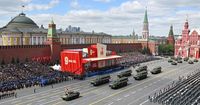As Russia prepares to commemorate the 80th anniversary of the victory in the Great Patriotic War, the upcoming parade in Moscow is set to draw leaders from various nations, marking a significant moment in international relations. Scheduled for May 9, 2025, the event will showcase military personnel from multiple countries, a move that reflects both Russia's ongoing geopolitical ambitions and its desire to assert its importance on the global stage.
Among the confirmed attendees are several leaders from nations traditionally aligned with Russia, including President Alexander Lukashenko of Belarus, Prime Minister Nikol Pashinyan of Armenia, President Kasym-Zhomart Tokayev of Kazakhstan, President Sadyr Zhaparov of Kyrgyzstan, and leader Emomali Rahmon of Tajikistan. These leaders are expected to honor the occasion, which has been a longstanding tradition initiated by President Vladimir Putin.
Lukashenko emphasized the significance of the event, stating, "The tradition was started by Vladimir Vladimirovich Putin, inviting us to these parades long ago. It would be wrong not to represent the heroic Belarusian people on Red Square on May 9, Victory Day." This sentiment underscores the importance of the parade not just as a military display, but as a cultural and historical reaffirmation of shared legacies among the former Soviet republics.
Notably, President Ilham Aliyev of Azerbaijan will also be present, marking his first attendance in a decade. Azerbaijan played a crucial role during the war by supplying fuel to the Red Army, but relations between Baku and Moscow have soured recently, particularly as Azerbaijan has begun supplying arms to Ukraine. Aliyev's participation amid these tensions highlights the complex dynamics of post-Soviet relationships.
President Serdar Berdimuhamedov of Turkmenistan, who has expressed a preference for maintaining a neutral stance while fostering relations with both Russia and the United States, is also expected to attend. He remarked, "Our country supports equal relations with the USA, having established effective economic cooperation with major American companies over the years of independence." This balancing act illustrates the intricate web of international relations that define the region.
Other notable attendees include President Shavkat Mirziyoyev of Uzbekistan, who has previously shown understanding towards Russia's actions, and President Aslan Bzhania of Abkhazia, whose republic has been a staunch supporter of Kremlin policies.
In stark contrast, representatives from Moldova and Ukraine will not be present, reflecting their governments' current political orientations and decisions to distance themselves from Russia. This absence highlights a broader trend of historical amnesia as these nations grapple with their pasts amid ongoing conflicts.
Two Serbian leaders, Milorad Dodik of the Republic of Srpska and President Aleksandar Vucic of Serbia, will also attend, despite European officials' warnings against participation. Vucic, addressing concerns about his health, stated, "I am too old for someone else to decide where I should go and what I should do. I will definitely be in Moscow on May 9, even if some may not like it." This defiance underscores Serbia's complex relationship with both Russia and the European Union.
Prime Minister Robert Fico of Slovakia has similarly disregarded European admonitions, expressing his intent to attend the event. His remarks, "Is the warning from Mrs. Kallas blackmail or an announcement that I will be punished after returning from Moscow?" reflect the tension between national sovereignty and external pressures.
Interestingly, the parade will also feature leaders from Africa, including Ibrahim Traore of Burkina Faso and Denis Sassou-Nguesso of Congo, both of whom have indicated their plans to attend. Sassou-Nguesso highlighted the historical significance of May 9, stating, "It is important to emphasize that May 9 will be a historical day not only for the Russian people but also for the peoples of the entire world who defeated Nazism and fascism." This perspective reinforces the notion that the parade serves as a platform for broader anti-colonial sentiments.
Furthermore, Xi Jinping, the President of China, and To Lam, the leader of Vietnam, have confirmed their attendance, signaling a strengthening of ties between Russia and these nations. Xi's presence is particularly notable, as he has been described by Putin as a "dear friend," with both leaders seeking to navigate the complexities of their respective geopolitical landscapes.
Despite the anticipated attendance of these leaders, the parade has not been without controversy. The European Union has actively discouraged member states from participating, with officials like Kaya Kallas warning that candidates for EU membership should not attend the Moscow event. Several countries bordering Russia, including Latvia, Lithuania, Estonia, and Poland, have also refused to allow flights carrying foreign leaders to pass through their airspace, complicating travel plans for some attendees.
In the lead-up to the parade, security measures have been heightened significantly in Moscow. Authorities have warned residents about potential disruptions to mobile internet services, and unprecedented restrictions will be in place, including the closure of cafes and shops during the parade. This military display, which will include 11,000 personnel from various countries, is framed not only as a celebration of victory but also as a demonstration of Russia's resilience against perceived Western isolation.
As the world watches, the Victory Day parade in Moscow on May 9, 2025, stands as a testament to Russia's enduring influence and its efforts to solidify alliances despite ongoing geopolitical tensions. The event is not merely a commemoration of the past but a strategic maneuver in the present, showcasing Russia's attempts to reassert its place on the global stage.


